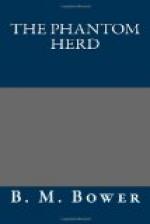When the herd straggled down in what seemed an endless stream of storm-driven animals, Luck knew that the boys had done their work well. He knew cattle as he knew pictures; he knew that a full two thousand came over that ridge through a shallow pass he had chosen, “‘Every hoof’ is right,” he remarked to Bill Holmes with a dry approval. “I’d hate to go hunting meat where that bunch was gathered from. Looks like they’d combed the country for fifty miles around.” He sent a quick glance to the pinnacle where Annie-Many-Ponies stood waiting to give the signal. He wished that she had realized the importance of these cattle scenes keenly enough to have given him the signal at the cost of breaking her pose. But he had only himself to blame. He should not have taken the risk, even though he had believed that the cattle would not arrive for another half hour. He should have been ready; he had told the boys to send them right over the ridge when they came up to it, because he wanted to preserve unbroken that indescribable atmosphere of a long, weary journey.
Still they came; a good twenty-five hundred, he was ready to wager, when the last few stragglers, so weak that they wobbled when they hesitated before descending a particularly steep place, came down the slope. It surely did eat up film to take the full magnitude of that march, but Luck turned and turned and gloated in the bigness of it all.
“All right, Annie,” he called out when he had taken the last of the herd as they filed out of sight into the narrow gully that would lead them to the flat half a mile below, where he meant to get other scenes. “Wave flag now for boys to come!”
Annie-Many-Ponies lifted high the black flag and waved it in slow, sweeping half circles above her head. “Boys, come,” she called, a moment after.
Luck, still not trusting the camera to Bill Holmes, swung back slowly to the pass and made a panorama of the desolate hillside and the chill, forbidding mountains behind. At the pass he stopped. “How close?” he shouted to Annie. “Come now,” she called down to him, and Luck began to turn the crank again, watching like a hawk for the first bobbing black specks which would show that the boys were nearing the crest of the ridge.
They came, on the very instant that he would have chosen for their coming. Side by side they rode, drooping of shoulders, and yet with their bodies braced backward for the descent which at the top was rather steep. “Register cold—horses leg-weary—boys all in—” read the script which Luck knew by heart. It was cold enough, and the camera must have registered it in the way the snow was heaped upon their hatbrims, drifted upon their shoulders, packed in the wrinkles of their clothing and in the manes and tails of the horses. And the horses certainly were leg-weary; so weary that Luck knew how the boys must have ridden to gather the cattle and to put their mounts in that condition of realistic exhaustion. In the story they were supposed to have ridden nearly all night,—the night-guard who had been on duty when the storm struck and the cattle began to drift, and who had stuck to their posts even though they could not turn the herd.




